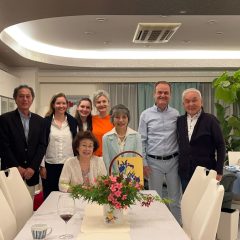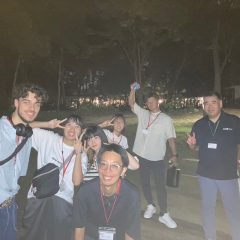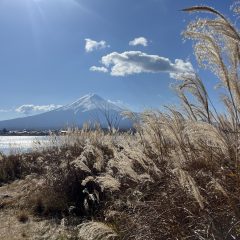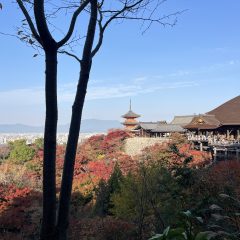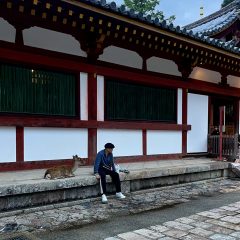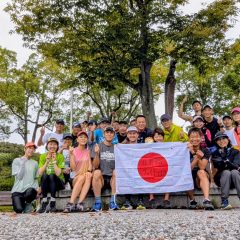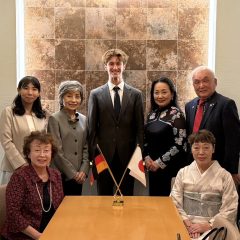☆☆☆First report of Vincent Quiring, 24th scholarship holder of the GRÜNWALD foundation☆☆☆
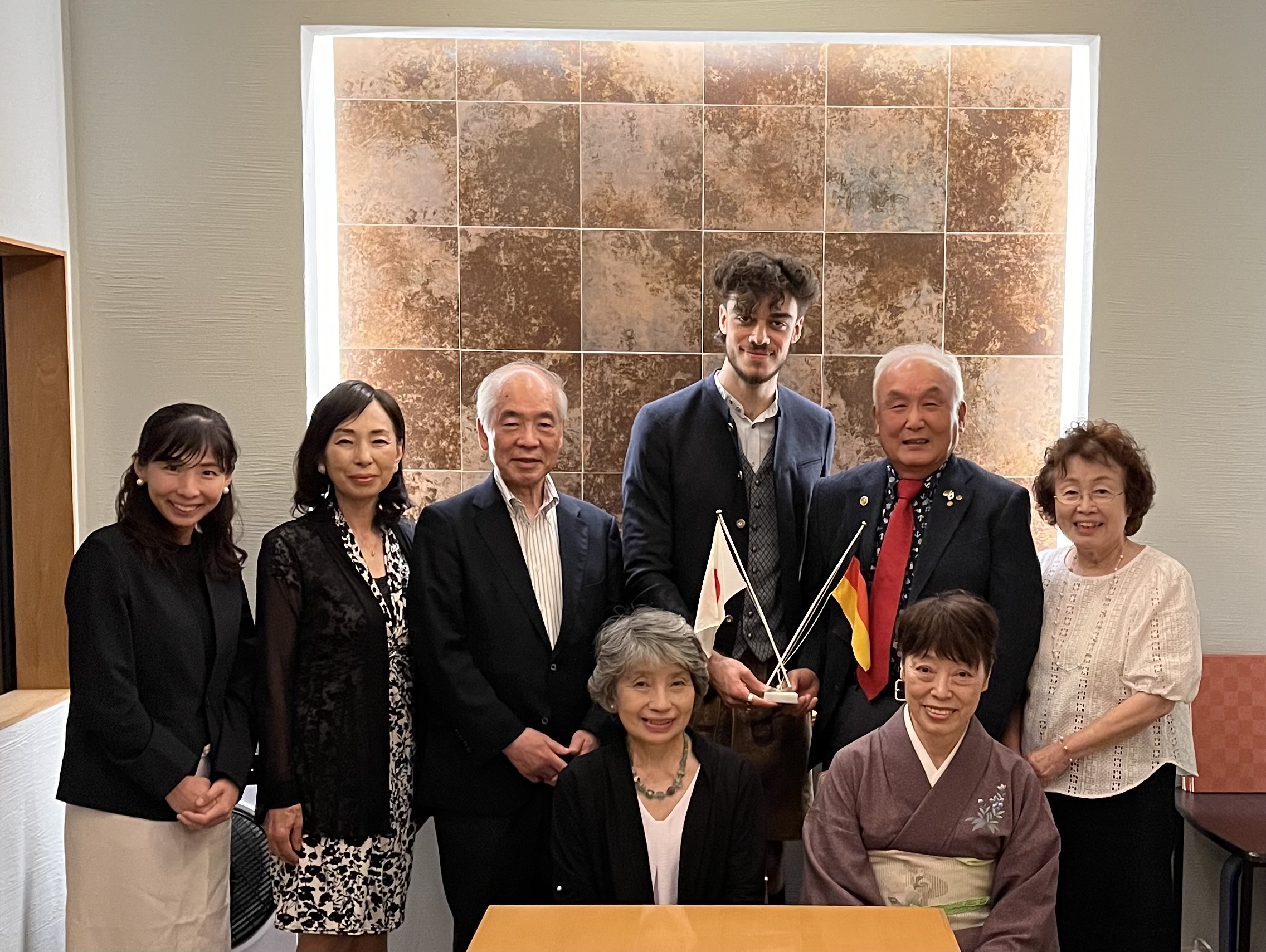
With a feeling of melancholy and sadness – a gentle, soft melancholy – the fluff, which has become loose and cold, falls back into the nest. The bird lolls. Short twitching movements announce a change. The last rays of sunshine wet the feathers. A flock of other birds flies in the sky. High above. The bird looks up and thinks of a better time. But the first jump out of the nest is not easy. So he trembles. The iron birds in the sky are no help. The chick is shown the wrong values and roles. It sobs. All alone in the nest, it is no longer worth staying there. A cold wind blows down from above. But it rises and jumps.
With these lines, which I wrote under the influence of “The Endless River” by Pink Floyd, in a Lufthansa iron bird, I jumped into my new adventure. A little scared, a little unsure and very nervous to boot, I lay in this semi-comfortable seat and realized for the first time what was actually happening. A long-awaited dream, a deeply echoing call had finally been answered. I was truly on my way to Japan.
A few dozed hours later, interrupted by the recurring airplane noises, turbulence (which was quite distressing considering the typhoon currently raging over Japan) and a sudden desire to fill my notebook for Japan with thoughts, sketches and texts, I landed in the country of my childhood dreams. I was now in Tokyo, my first destination of the trip.
First impressions at Haneda Airport: “A lot of people” – „ 熱い ~ Incredibly hot” and “Thank you for labeling everything so incredibly great (no irony)”.
Due to the typhoon, my Shinkansen train to Osaka didn’t run – so I stayed in Tokyo for two days for the time being. After quelling a few worries about possible misunderstandings during the cab ride, I threw myself exhausted onto my small hotel bed. I stared at the spinning ceiling fan and could still hardly believe it. Below me lay the bustling city of Tokyo – me, now finally a part of it. I was really tired, but all the excitement kept my eyes open. I left the hotel and took my first step into new territory. Fortified with compliments from the nice receptionist about my recently painted nails, I got on the train and headed to the places I remembered from my recent trip to Japan (with my mom in spring 2024). Shibuya Crossing was now my first address. “I really wanted to explore,” I thought to myself as I stood in the crowds, just like back then, but this time alone. I had just been on a plane and was now running across an intersection with hundreds of people, not knowing where I was actually heading. I followed the crowd and felt a strange buzz of happiness, surrounded by neon lights, flashing advertisements, singing music stars in commercials, as well as the lively music echoing throughout the streets of Shibuya. “Arrived” – it echoed in my head, however.
The following day, I decided to visit Meji-Jingu, a Shinto shrine in Shibuya. Despite the pouring rain, I was magically drawn through the dark green paths lined with tall plants that eventually led to the center of the shrine. It felt as if time stood still for a moment. In the midst of the brute, gray, brutalist building blocks, there is truly a spiritual green thicket that seems to offer people a place of refuge. Under small roofs protruding here and there, the most diverse personalities gathered to seek shelter from the rain. That was the first time this thought occurred to me. “Somewhere people are very similar”. This thought continued the deeper I went into the shrine. We all just seem to want to live, feel good and wake up without a worry in the world. It’s actually quite a plausible assumption, but at that moment it seemed special to me.
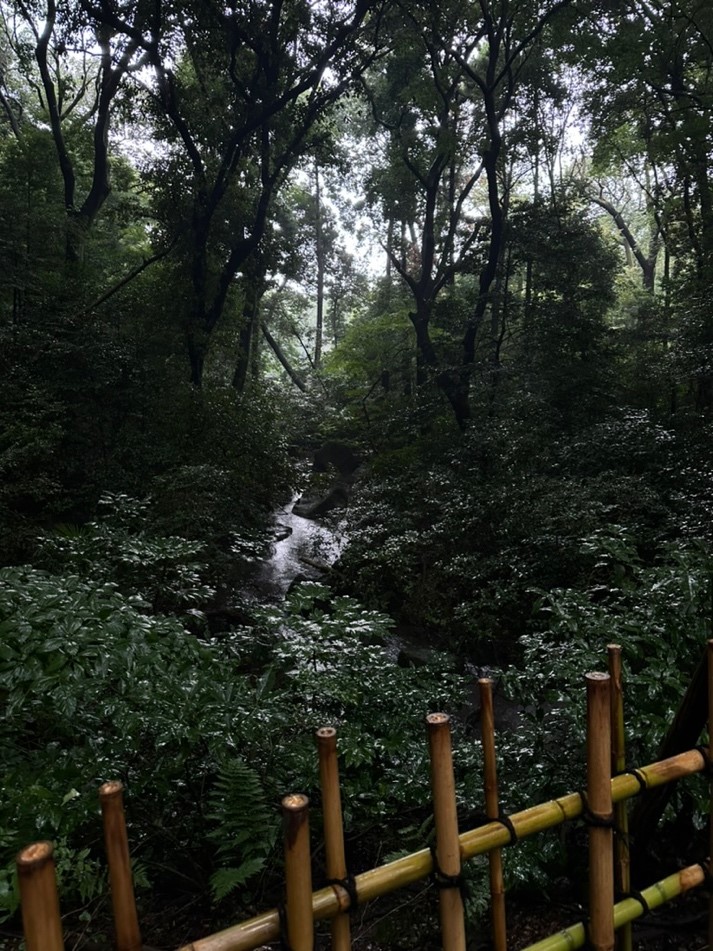
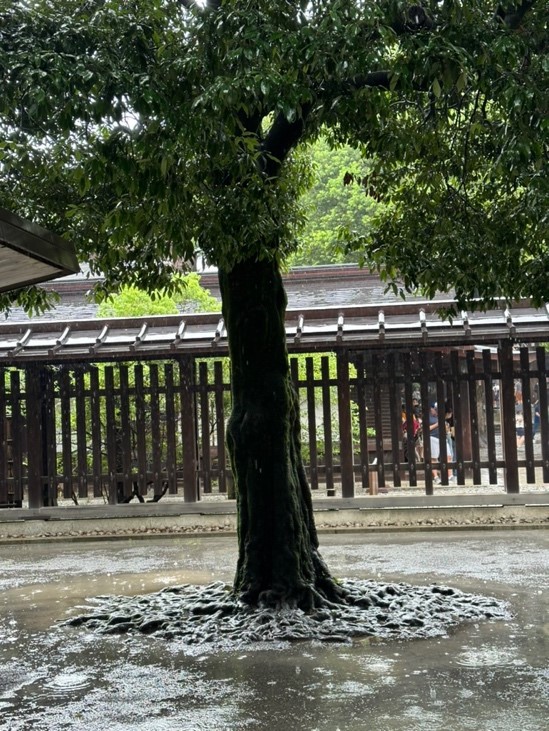
(Meji Jingu Shrine)
I read the small wooden signs under large, magnificent trees, also called 絵馬 ~ Ema. They embodied people’s deepest wishes to the gods, the afterlife or simply to the higher authority above us. To my surprise, most of the plaques were similarly inscribed. “Health for me and my family, help for my children, support at school and at work”. We all have worries, we all have fears. The uncertainty of the future guides us humans through life. As I myself have been dealing a lot with fears about the future, growing up and taking on responsibility recently, I was very moved at that moment. As an adolescent, life can often seem a little overwhelming as more and more things change rapidly with each passing year of life. The realization that other people are also influenced by similar thought processes and therefore need help gave me a feeling of lightness, but also melancholy. It seems that despite different cultures, languages and places, people are always human.
So I left the shrine with an open-minded feeling.
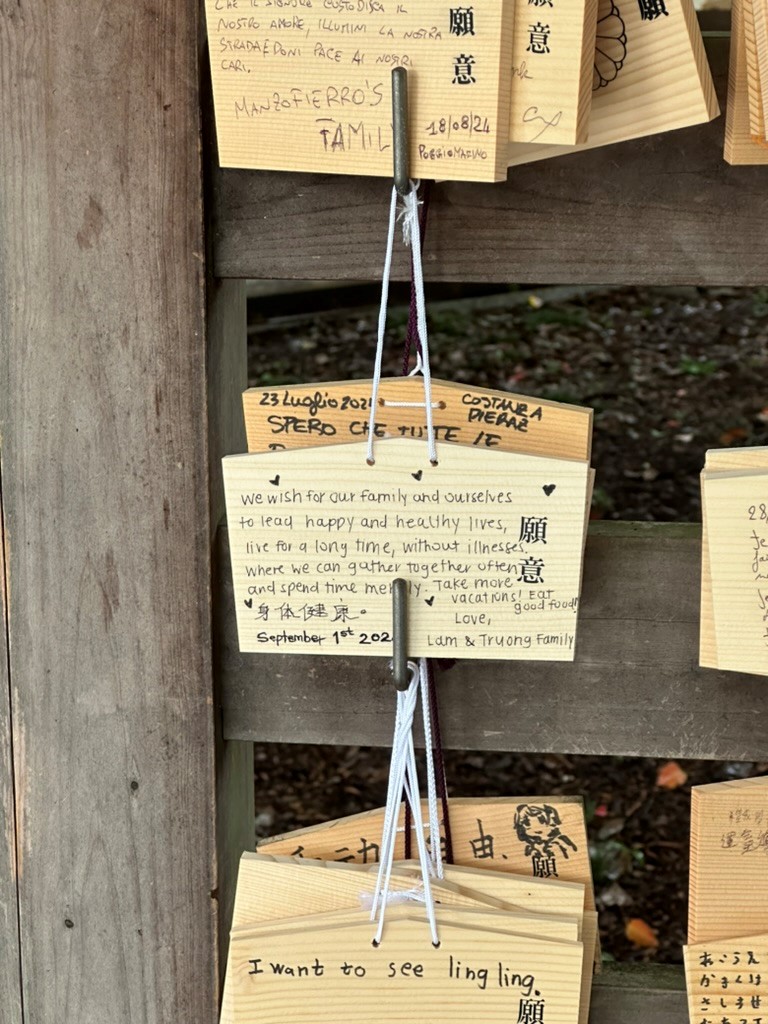
(Ema in Meji Jingu Shrine)
I spent my last day in Tokyo in the Ginza district, visiting a goldfish art exhibition. After some initial difficulties finding the location, I immersed myself in a colorful, intoxicating world. What initially appeared to be “beautiful fish!”, “What an unusual shape!” and “What a variety!” later turned into a deep philosophical thought, through which I subsequently wrote a short story in a small café. These animals were beautiful, their fragile fins, shimmering scales and yet their movements through the water of the aquariums were insignificant. The deeper I delved into the exhibition, the more I asked myself – “What is it like to lead a life all alone for another individual?”. These fish seemed to exist only for us humans, they exist to be watched, marveled at, but never for more than a few minutes, as another fish will grab the attention afterwards. This gave me a lot to think about.
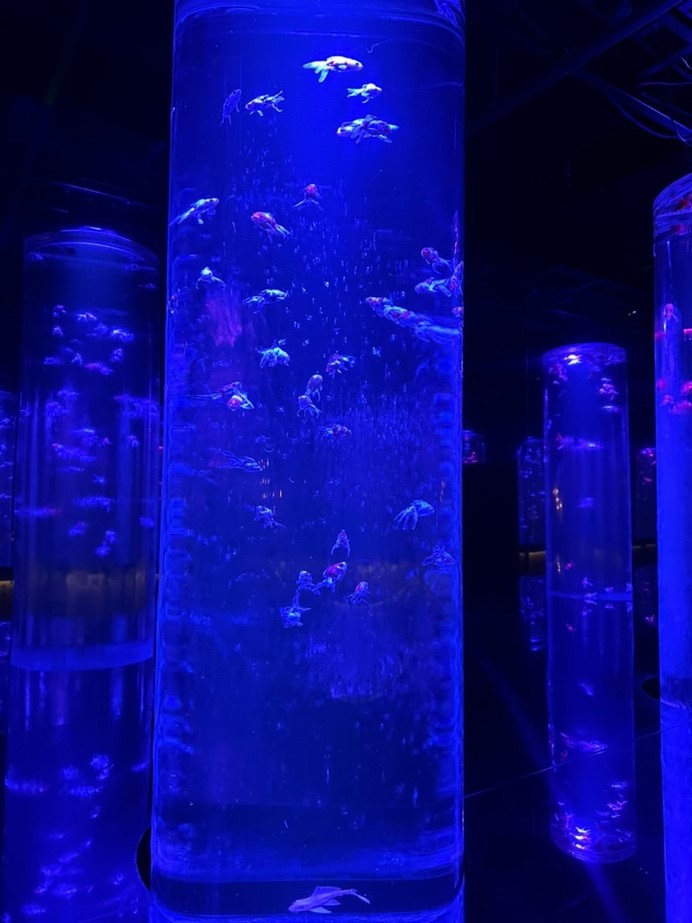
(Art Aquarium Museum Ginza)
I reflected this approach on our society, on our consumer behavior, our urge to be entertained, even at the expense of the suffering of others, on the system of conformity and the loss of those who do not conform, on the right of the strongest. A stinging impulse lay beneath the beautiful exhibition. I now tried all the more to pay more attention to each fish than the average visitor probably did. A step towards doing justice to these existences locked behind glass.
A small excerpt from the short story I wrote afterwards:
“[…] Most of the fish slowly lose interest in me and disappear into the background. All except one last specimen, which always seems to be watching me. Almost as if it wants to communicate with me. I look at the fish’s bubbling mouth and hear it softly form words. “Please – get us out of here”. I replied to the fish: “If I let you out of this tank, you would all suffocate miserably on the dry, dusty floor”. But the fish replied: “This fate, human, seems truly more pleasing than swimming in these waters for even one more day, being photographed, looked at and briefly admired for one more day. People see us in this prison, love us, dream about us for a few minutes and move on. It is truly sobering to be just a distraction, a way out, an escape. Think of a life you were given, just to serve – for a few minutes. So if you really love me, break the glass in front of you and give us all the freedom we deserve. Let us live. […]”
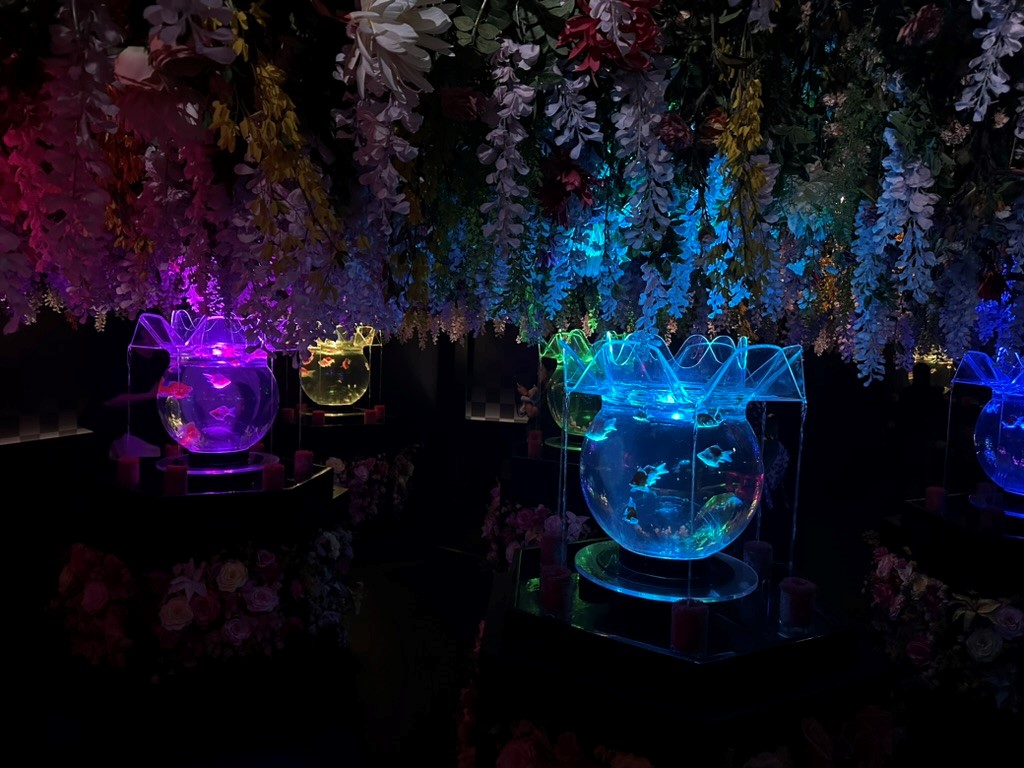
(Art Aquarium Museum Ginza)
That same day, I was finally on the Shinkansen on my way to Osaka. I arrived very excited about my new surroundings and luckily met Mr. Okamoto quickly and without complications.
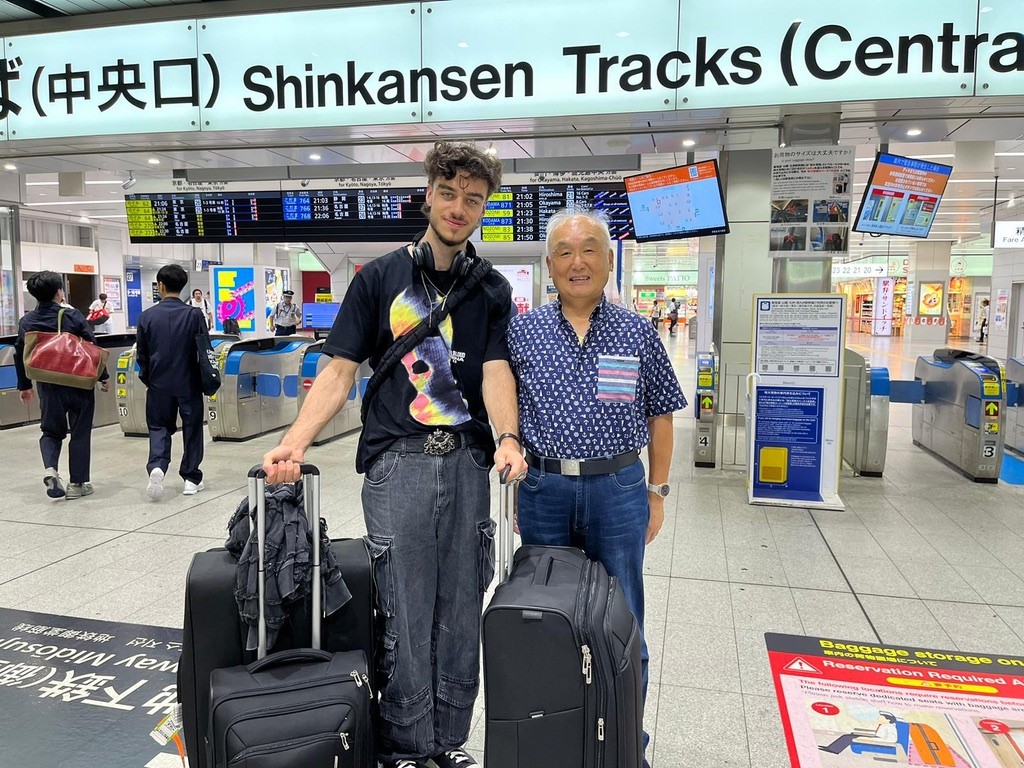
(Arrival in Osaka)
In the days that followed, I got to know my future Japanese life more and more. Difficulties such as shopping in Japanese supermarkets became more and more of a habit (although I still sometimes guess what questions I will be asked at the checkout, which often leads to awkward situations :,) ). The fact that supermarkets constantly offer fresh, prepared food, packaged in small tupperware boxes, is wonderful. And at an incredibly cheap price for German immigrants.
Over the days, I noticed a few positive things about life in Suita. Suita, with its small, cute, secluded residential areas, corresponds exactly to the idealization of Japanese life for Westerners
A quiet, serene area, a thoroughly nice and helpful neighborhood, as well as small winding alleys and layered building constructions. It’s the little things that make me feel nostalgic and at home, even though they probably wouldn’t even be worth mentioning for Japanese residents. Electricity pylons that seem to be hanging far too full, meandering lushly through the small paths, the sound of cicadas in the setting evening sun, a woman on a bicycle bringing herself and her child home after what has probably been a hard day’s work, a hugging gesture when entering the house with relatives, children running and laughing, probably playing a game. A feeling of warmth spreads through me, like a long-lost memory being dredged up again.
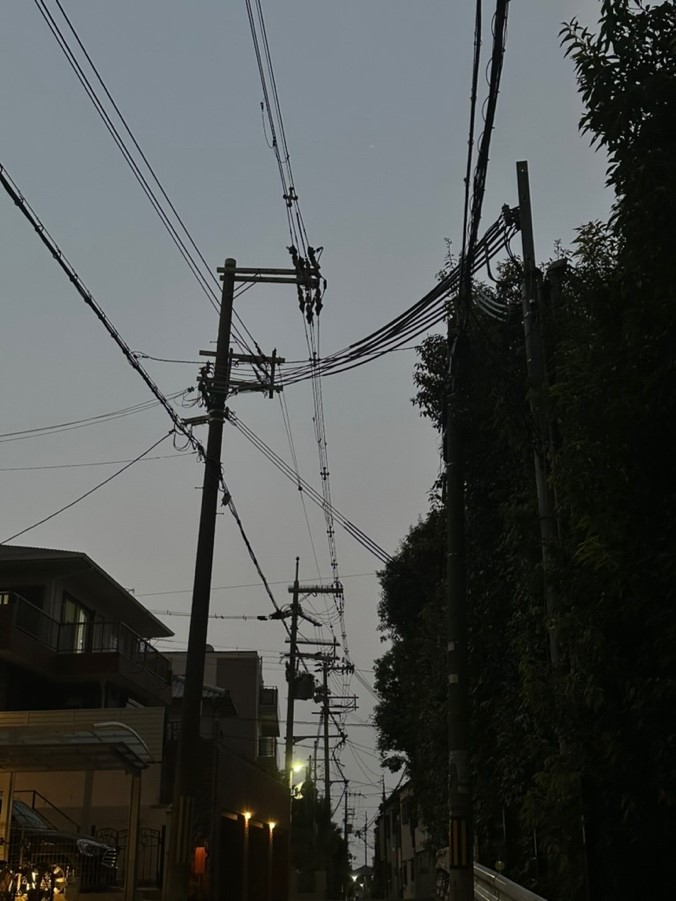
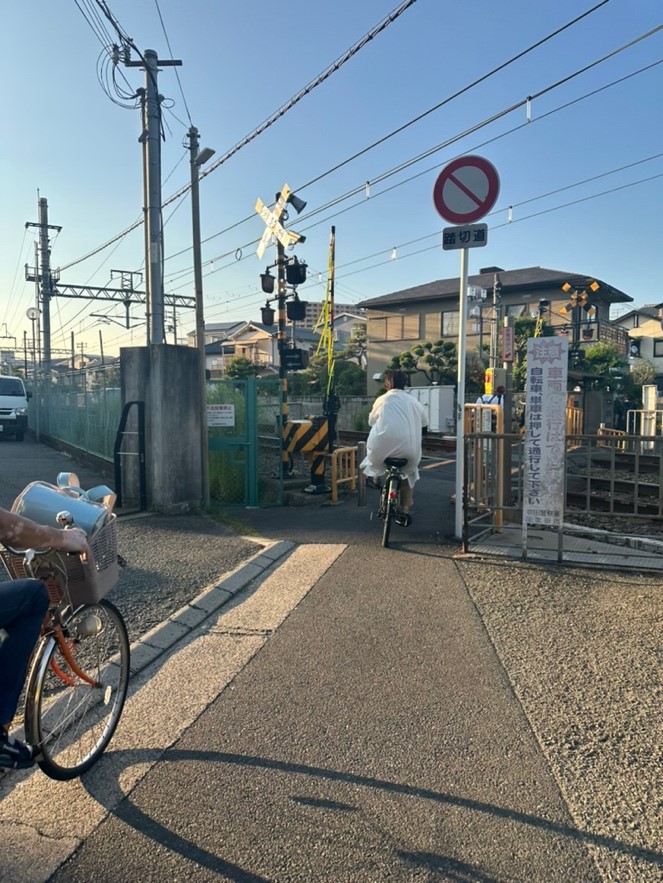
(Suita Neighbourhood)
Life in Suita is quiet and warm, like a balmy summer breeze.
Thanks to Mr. Okamoto, who showed me around Osaka for the first few days and often invited me to dinner, I was able to experience a lot of culinary delights. For example, the fact that Japanese food is not just about satisfying hunger. It is the celebration of an artistic act created by other people. Compared to Germany, it is often about taking time to taste, feel, think and perceive the moment. Since I now often eat alone, but of course even back then in Tokyo, this realization comes to me more and more regularly. The preparation of food can be a great form of art, and because it is ephemeral, it makes it even more special for me. It’s about the moment, the appreciation of the moment. A system that you often hear from relatives in everyday life in Japan. The appreciation of this moment, the food and in general – the appreciation of one’s own life.
So I was also very grateful when I had the opportunity to talk to the mayor of Suita in person. We sat in a beautifully furnished conference room for about an hour and, to my astonishment, talked a lot about Germany. I was very surprised at how concisely and up-to-date the mayor asked questions about Germany’s current difficulties. This was despite the fact that our countries are thousands of kilometers apart. After our conversation, I reflected a lot on my own global political knowledge and was all the more motivated to acquire more knowledge about current problems in individual countries. It was also extremely interesting to see how Germany is seen as a prime example in many respects – even if sometimes as an opportunity to implement things better in my own country. I consider this way of thinking to be highly exemplary, as it enables the comprehensive, efficient development of the respective countries.If we all learn from each other’s mistakes and adapt positive successes in equal measure, we can promote general progress.
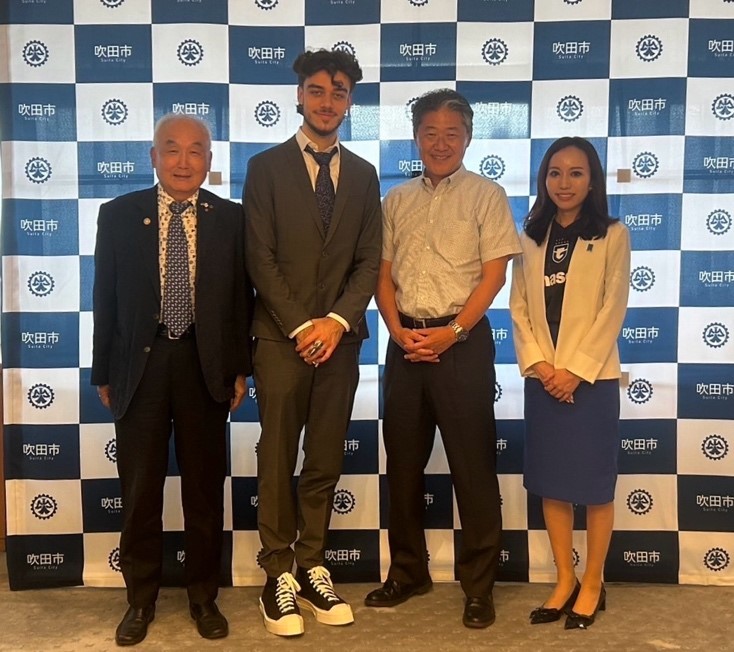
(Meeting with the mayor of Suita)
Learning together from mistakes and adapting positive things from each other, as well as showing voluntary commitment and social responsibility, are also Rotary’s resolutions.
In my first few weeks, I was invited to both a Rotary and a Rotaract event. I look back on both events with very positive memories. Both at Rotary, but especially at Rotaract, I was greeted warmly by everyone and taken by the hand. This behavior is very unusual in Germany, which is why I was all the more surprised. I have probably never experienced such incredible hospitality in my life. When I was looking for a place, I wasn’t just given directions, I was accompanied on the way, even if it was several minutes away. Not only was I advised to translate the lecture myself, but people also agreed to explain it to me in English themselves. I was asked whether any ingredients had been cooked into the food that I might be allergic to. I was also accompanied home, even though this route would not have been their own. So I arrived home after these events and was incredibly fulfilled socially. At these events, I also met young, interesting and kind people with whom I am still in contact.
I think it’s a great pity that similar behavior seems to be a rarity in Germany, as most people tend to focus on themselves instead of opening their arms to a weaker member of the group. Germany can take a great example from Japan’s incredibly welcoming and open mentality. Filled and inspired by this philosophy, I would also like to offer my counterpart this experience.
Finally, I would like to write a short paragraph about the extremely heart-warming welcome party. Thanks to Mr. Okamoto, I was once again able to experience a whole new culinary world, as I have done so often in recent weeks. As I wrote above, eating in Japan really is always a little journey, a little experience even. This was also the case that evening, when we were treated to 13 different small courses. Japanese cuisine is all about small but different flavors and tasting many different dishes throughout the evening. Both the food and the extremely friendly conversations, mainly in German, were an immense pleasure. I find it very interesting how much a language can divide but also unite people who speak the same language. I really enjoyed listening to the different stories of the other participants and comparing the Japanese view of Germany with my own view of Germany. It often seems as if others see Germany in a different light than I do.
I thought to myself at the time that my view of Japan was probably similar to the way the Japanese view their own country. Because often, I have to admit, I can hardly understand the praise and encouragement for Germany. Perhaps the grass is always greener on the other side, and we ourselves often fail to recognize the positive qualities of our country. Thank you very much for these suggestions and I hope to gain many more during my time in Japan.
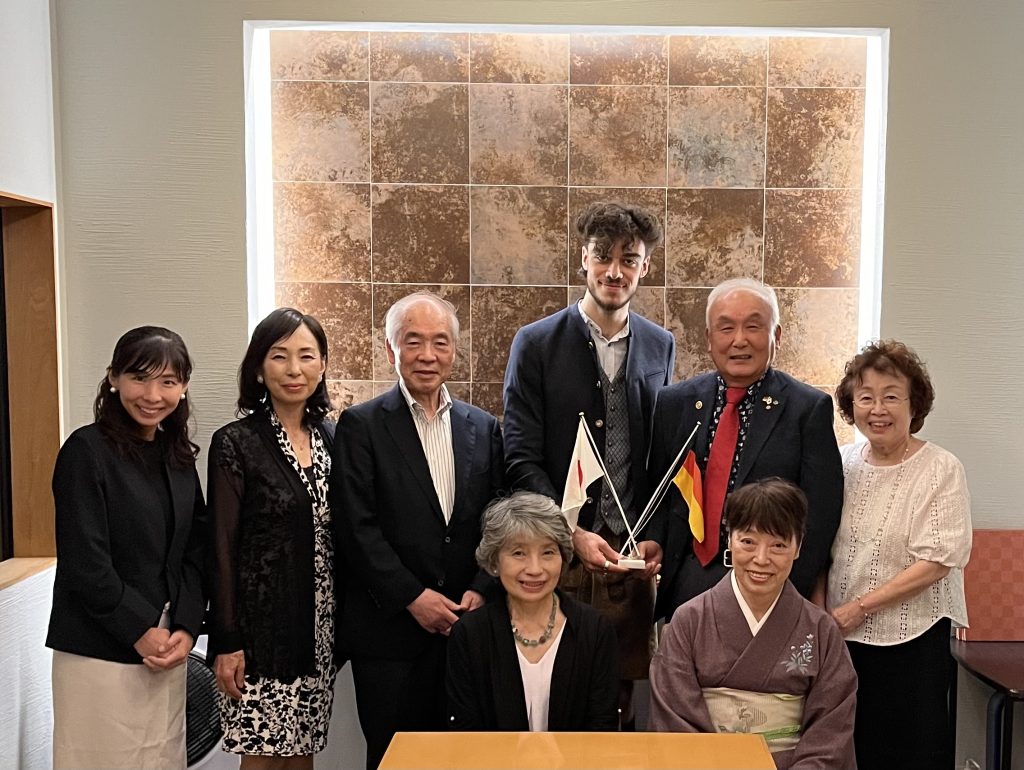
(Welcome Party)
Thank you!
Vincent Quiring

